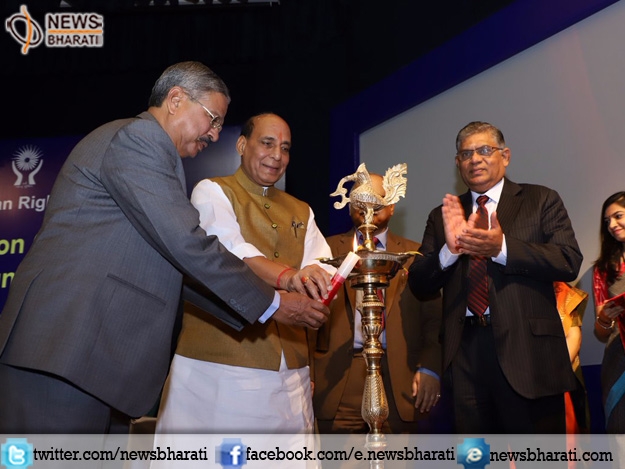“Rohingyas are not refugees but illegal migrants : Rajnath asserts in NHRC seminar
Total Views |
New Delhi, September 22: NHRC (National Human Rights Commission) two-day National Seminar discusses and covers serious aspects of a particular issue. Like this time, the seminar focused on the role of media in civil society in promoting good governance and human rights. Home Minister Rajnath Singh addressed the seminar at New Delhi.

During his speech, Singh covered various issues and spoke his mind out extensively. Starting with the migrant situation, Singh said that any sovereign nation is free to take action against illegal migrants. He said that the issue of deportation of Rohingyas for India is not a matter of ego and confrontation but of principles. Those who, in the name of human rights, are expressing concern on the rights of others should bother first for the rights of the citizens of India. The citizens of the country have the first right on its resources and not the illegal migrants. Rohingyas are illegal migrants; they are not refugees for which a process is required to be completed, which they never followed.
Furthermore, he added, “India is not a signatory to International Laws on Refugees or to the UN Refugee Convention 1951, hence, the question of its violation does not arise. The principle of non-refoulement would apply to Rohingyas only if, they were given asylum in India. India has extended aid to Bangladesh for the welfare of Rohingyas there. State Counsellor of Myanmar, Aung San Suu Kyi has raised a ray of hope by saying that her country is prepared to take back Rohingyas.”
Describing the seminar organized by the NHRC as very relevant, Singh said that development without bringing dignity to human life would be meaningless. He said that the PM Ujjwala Yojna was meant to ensure dignified life to crores of women and we believe development without dignity is of no use. He listed several measures and schemes introduced by the government during the last three years, which are aimed at overall welfare of the people by bringing transparency and accountability in its initiatives so that benefits of welfare schemes reached out the real beneficiaries. Like, the aim to build a house for all the Indian citizens by 2022 along with electricity services.
On the contrary, Justice and Chairperson HL Dattu said that the universality of Human Rights, their focus on human dignity and their concern for accountability make them uniquely appropriate for reshaping notions of development, cooperation, good governance and combating discrimination and exclusion to reach the goal of achieving a society where ‘Human Rights for All’ becomes a reality.
With subtly directing his statement towards Centre, Dattu said, “There is a need to bring together politics, economics and culture in a more symbiotic relationship.” The NHRC had recently issued a notice to the Centre over its plan to deport Rohingyas, who are residing in various parts of India.
About NHRC Seminar: It was divided into five technical sessions spread over two days. The sessions are being chaired by NHRC Members and participants include domain experts and top government functionaries from the Centre, state governments and Union Territories. The discussion focused on the role of media in civil society in promoting good governance and human rights, discerning indicators of good governance, global best practices and impact of information technology on good governance, service delivery mechanism and measures to enhance transparency and accountability, health and Swachh Bharat initiatives, new paradigm and challenges in good governance with an Indian perspective.